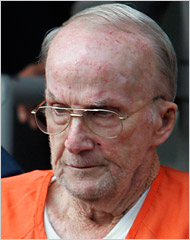| @wehaitians.com | |
No one writes to the tyrants | |
HistoryHeads/Not Just Fade Away |
| Correspond with us, including our executive editor, professor Yves A. Isidor, via electronic mail: |
| letters@wehaitians.com; by way of a telephone: 617-852-7672. |
| Want to send this page or a link to a friend? Click on mail at the top of this window. |
|
 |
|
| Posted Thursday, May 10, 2007 |
| Indictment In '65 Killing That Inspired Rights March |
By ADAM NOSSITER |
NEW ORLEANS, May 9 — A grand jury in Alabama handed up an indictment on Wednesday in an obscure killing that helped inspire the historic Selma-to-Montgomery march in 1965. The case is the latest in a series of belated prosecutions of crimes from the civil rights era.
 |
Rogelio V. Solis/Associated Press |
| James Ford Seale at the federal courthouse in Jackson, Miss., on January 29, 2007. |
In February 1965, a black farmer, Jimmie Lee Jackson, 26, was shot by Alabama state troopers who were suppressing a voting rights demonstration in Marion in the Black Belt. Historians have said the killing indirectly helped lead to the Voting Rights Act of 1965.
The identity of the killer has long been known, James B. Fowler, a retired trooper, and on Wednesday Mr. Fowler’s lawyer, George Beck of Montgomery, said he could “only assume” that Mr. Fowler was the subject of the indictment.
The district attorney would not release the name or the charge until the defendant had been notified.
Mr. Beck said, “I think we can all assume that Mr. Fowler was indicted.”
Mr. Fowler, 73, has admitted the killing in interviews but insisted that the shooting was in self-defense as Mr. Jackson tried to grab the trooper’s gun.
Books on the civil rights movement have painted a different picture of that night. Multiple accounts say that Mr. Jackson was in a group of demonstrators pushed back by club-swinging troopers into Mack’s Cafe and that he watched his grandfather, Cager Lee, 82, being beaten and his mother, Viola Jackson, attacked.
____________ |
|
| A retired trooper has long said he shot a black farmer at a protest in self-defense. | |
____________ |
When Mr. Jackson lunged to protect her, the historians say, a trooper shot him twice in the stomach.
He died eight days later. To protest, activists decided to march from Selma to the state’s Capitol in Montgomery. The confrontation on March 7, 1965, or Bloody Sunday, led to the Voting Rights Act.
“It’s a very important case, because his death led to the voting rights march,” District Attorney Michael W. Jackson said Wednesday in an interview. “This event helped trigger the Voting Rights Act, which helped enfranchise a lot of people. I’m a direct benefit of it.”
Mr. Jackson noted that he was the lone African-American district attorney in Alabama and the first from Selma. He is not related to the victim.
Mr. Jackson, 43, said that he had read about the Jimmie Lee Jackson case as a child and that when he was elected in 2005, became determined to reopen it.
Mr. Beck was an Alabama assistant attorney general in the 1970s who helped prosecute another revived case, that of the 1963 16th Street Church bombing in Birmingham in which four girls were killed.
“This case is vastly different,” Mr. Beck said. “In the bombing case, someone intentionally planned and carried out a very heinous act. In the Fowler case, Mr. Fowler was sent over to quell a civil disturbance by George Wallace and Al Lingo.”
Mr. Wallace was the governor, and Mr. Lingo led the troopers.
In January, federal authorities in Mississippi arrested James Ford Seale, 71, in the kidnapping and murder of two black teenagers in 1964, Charles Eddie Moore and Henry Hezekiah Dee. Jury selection is scheduled for this month.
Mr. Fowler, the retired trooper, told The Anniston Star of Alabama two years ago: “Jimmie Lee Jackson was not murdered. He was trying to kill me, and I have no doubt in my mind that under the emotional situation at the time that if he would have gotten complete control of my pistol that he would have killed me or shot me.” Mr. Jackson said that though finding witnesses and evidence had been a struggle, “we’re very confident about the case we put together.”
Asked whether Mr. Fowler was the defendant, Mr. Jackson said: “You know who got indicted. I just can’t say it. You can figure that out."
Copyright 2007 The New York Times Company. Reprinted from The New York Times, National Report, of Thursday, May 10, 2007.
| Wehaitians.com, the scholarly journal of democracy and human rights |
| More from wehaitians.com |